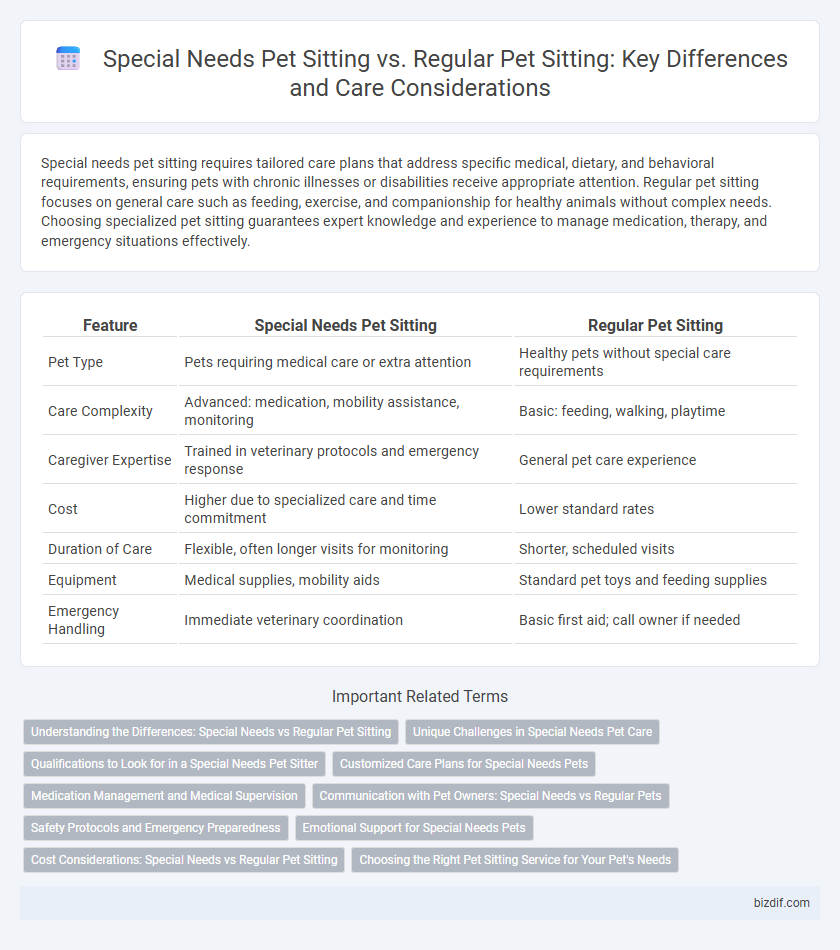Special needs pet sitting requires tailored care plans that address specific medical, dietary, and behavioral requirements, ensuring pets with chronic illnesses or disabilities receive appropriate attention. Regular pet sitting focuses on general care such as feeding, exercise, and companionship for healthy animals without complex needs. Choosing specialized pet sitting guarantees expert knowledge and experience to manage medication, therapy, and emergency situations effectively.
Table of Comparison
| Feature | Special Needs Pet Sitting | Regular Pet Sitting |
|---|---|---|
| Pet Type | Pets requiring medical care or extra attention | Healthy pets without special care requirements |
| Care Complexity | Advanced: medication, mobility assistance, monitoring | Basic: feeding, walking, playtime |
| Caregiver Expertise | Trained in veterinary protocols and emergency response | General pet care experience |
| Cost | Higher due to specialized care and time commitment | Lower standard rates |
| Duration of Care | Flexible, often longer visits for monitoring | Shorter, scheduled visits |
| Equipment | Medical supplies, mobility aids | Standard pet toys and feeding supplies |
| Emergency Handling | Immediate veterinary coordination | Basic first aid; call owner if needed |
Understanding the Differences: Special Needs vs Regular Pet Sitting
Special needs pet sitting requires specialized knowledge of medical conditions, dietary restrictions, and mobility challenges, unlike regular pet sitting which focuses on basic care such as feeding and exercise. Caregivers for special needs pets are trained to administer medications, monitor health symptoms, and provide additional comfort and support to ensure the pet's well-being. Regular pet sitting typically involves routine services without the intensive supervision or medical expertise needed for pets with chronic illnesses or disabilities.
Unique Challenges in Special Needs Pet Care
Special needs pet sitting demands expert knowledge in managing chronic illnesses, mobility issues, and medication administration that regular pet sitting typically does not cover. Caregivers must be trained to recognize subtle behavioral changes and provide customized routines to ensure comfort and well-being. The complexity of special needs care requires heightened vigilance and a compassionate approach tailored to each pet's specific health challenges.
Qualifications to Look for in a Special Needs Pet Sitter
Special needs pet sitters must possess specialized training in managing chronic illnesses, disabilities, or behavioral challenges, often including certifications in pet CPR and first aid. Experience with administering medications, using medical equipment, and understanding veterinary care plans is crucial to ensure the pet's safety and comfort. Look for sitters with verified references and a demonstrated ability to handle emergency situations specific to special needs pets.
Customized Care Plans for Special Needs Pets
Special needs pet sitting involves creating customized care plans tailored to the unique medical, dietary, and behavioral requirements of pets with chronic conditions or disabilities. Regular pet sitting typically follows standard routines, whereas special needs care prioritizes individualized attention, medication management, and specialized activities to ensure the pet's comfort and well-being. This personalized approach reduces stress and promotes recovery and quality of life for special needs animals.
Medication Management and Medical Supervision
Special needs pet sitting involves comprehensive medication management, including timely administration of prescriptions and close monitoring for side effects, essential for pets with chronic illnesses or post-surgery care. Medical supervision in special needs care requires specialized training to recognize subtle health changes and respond promptly, unlike regular pet sitting which typically focuses on basic feeding and exercise. This enhanced level of care ensures pets with medical conditions receive tailored support for optimal recovery and well-being.
Communication with Pet Owners: Special Needs vs Regular Pets
Special needs pet sitting requires enhanced communication with pet owners to understand specific medical conditions, medication schedules, behavioral triggers, and emergency protocols, ensuring tailored care. Regular pet sitting involves standard updates on feeding, exercise, and general behavior, with less intensive detail required. Clear and frequent communication is essential in both, but special needs care demands more precise and timely information exchange to maintain the pet's health and comfort.
Safety Protocols and Emergency Preparedness
Special needs pet sitting requires specialized safety protocols including administering medications, monitoring chronic conditions, and recognizing signs of distress unique to each animal, surpassing standard practices in regular pet sitting. Emergency preparedness involves having tailored action plans, such as access to specialized veterinary contacts and medical equipment, ensuring prompt responses to health crises. Regular pet sitting prioritizes general safety measures like secure environment supervision and basic first aid, which may not suffice for pets with complex medical needs.
Emotional Support for Special Needs Pets
Special needs pet sitting involves tailored care that addresses the unique emotional and physical requirements of pets with disabilities, chronic illnesses, or anxiety disorders. Emotional support for special needs pets is critical, often requiring consistent routines, gentle handling, and therapeutic interactions to reduce stress and promote well-being. Regular pet sitting generally focuses on basic needs such as feeding and exercise, lacking the specialized attention necessary for emotional stability in special needs animals.
Cost Considerations: Special Needs vs Regular Pet Sitting
Special needs pet sitting generally demands higher costs due to specialized care, including medication administration, mobility assistance, and continuous monitoring, which regular pet sitting typically does not require. The additional time, expertise, and potential use of specialized equipment significantly increase service fees compared to standard pet care. Pet owners should budget accordingly, recognizing that the tailored support ensures better health outcomes and safety for pets with unique medical or behavioral challenges.
Choosing the Right Pet Sitting Service for Your Pet's Needs
Special needs pet sitting requires specialized care tailored to pets with medical conditions, mobility issues, or behavioral challenges, ensuring their unique needs are met during their owner's absence. Regular pet sitting typically involves basic feeding, walking, and companionship but may lack the expertise necessary for complex health or emotional support. Selecting a pet sitting service with certified experience in managing special needs guarantees appropriate attention, safety, and comfort for vulnerable pets.
Special needs pet sitting vs Regular pet sitting Infographic

 bizdif.com
bizdif.com